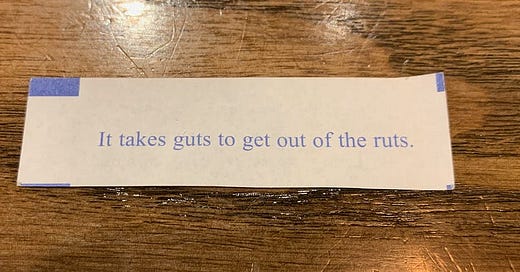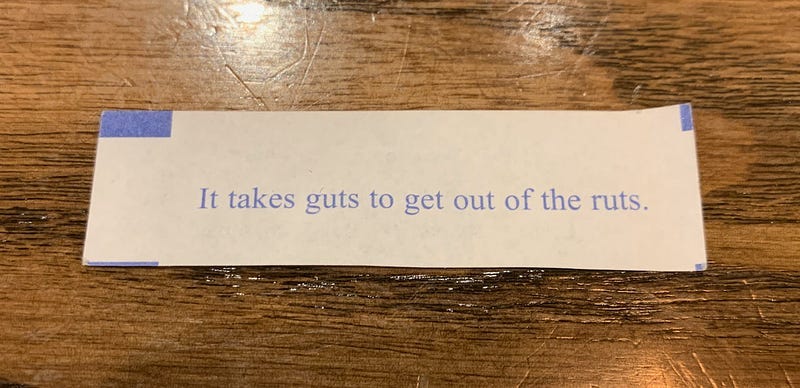Sometimes we get stuck in spots that we never envisioned would be anything more than temporary resting places. I had become stuck in a job I had casually drifted into, at a violin shop. When I started, it seemed a good place to weather the fallout from the breakup of my first real relationship, and figure out what to do about the doctorate I’d been pursuing without quite knowing why I was pursuing it. Nothing about the job suggested the word “career.”
I could’ve gone back to teaching public school — I was already certified — but teaching was a job I brought home with me at night. Children have real needs that teachers must address every moment they’re in front of a classroom, and that requires being prepared and marshaling a profound amount of emotional resources each and every day. It’s exhausting — and those months of summer vacation are both necessary, and not enough. (Teachers do not get paid for those summer months. Their nine-month salaries are divided over twelve months for convenience.)
The shop was just where I needed to be for a while. I pursued some wonderful, creative performance opportunities, began to hone my skills as an arranger, and even composed a little. It seemed like a job that perfectly supported my music habit. I’ll always be grateful for the time and energy that working at the shop left me for performing and composing, and I wish I’d done even more of it. That’s what the job was supposed to be for — a support system for the real work I wanted to do.
I thought of leaving often, but once you’ve gotten used to a routine, and it becomes a groove that your life moves in almost effortlessly, change becomes more difficult. Ruts are easy, but they’re also traps. And when life rolls along that easily it leaves a lot of space for introspection.
I became aware that many of my life choices were really the result of “drift.” Drift is what happens when you imperfectly perceive the direction you want to move in but have no real understanding of the commitment you must make to get there. When I did finally understand that commitment, I faltered. Did I really want x, y, or z? They had seemed like great options from the outside. The questions hung, suspended in the air, and the ruts got deeper.
Fate is a word we use to avoid answering questions raised by forgivable, honest mistakes. We ask ourselves why we falter; Fate (or Destiny) provides an easy answer: I’m not capable. I’ve found my level. I was destined to end up here. Nevermind our unrealistic expectations — we pride ourselves on having standards so high that no one can live up to them! Fate provides a convenient excuse for our own failures, while perversely allowing us to scorn those who manage to find workable solutions to the mistakes they have made.
Fate has its own brief liturgy:
I could have done that, and done it better, if only…
After a decade there, working in the violin shop began to feel like training to be an actor but ending up in craft services. It was a perfectly honorable occupation, but I couldn’t respect myself for not making better use of my abilities. It was also a terminal position — I couldn’t rise any higher there without buying the business; I was never offered that option even as the shop changed hands — and if I had been, I wouldn’t have known what to do with it.
At this point I began to think about doors I’d closed deliberately earlier in my life. I had always been a good student; my academic and musical scholarships paid for my undergraduate education. I had known I was going to be a musician, but I could just as easily have chosen engineering, or some other technical field. These abilities were parts of me as much as music was, and maybe it was time to revisit them.
I began looking for a new path, and the search brought me to data analysis. I made the choice to enroll in a bootcamp with an excellent guarantee — if I didn’t receive a job offer within the first six months after finishing the program, I’d get my money back (I chose Springboard’s Data Analysis Career Track program). The guarantee helped me make the choice, but….
I chose, not because I was convinced that this path is mystically the “right” path, but because I find the work engaging, I’m capable of doing the work, and as I acquire more skill and expertise, I’ll be paid for it. But I don’t know if it’s the right path, or that I will even succeed.
I have taken a step in a direction based on the available evidence I have about my capabilities, my personality, and what I know about the variety of opportunities that lie in this direction — but there are no guarantees.
I’ve taken that step in faith — and during the long year it took me to complete the program, every moment I spent learning Python, SQL, Tableau, completing projects, was a step in faith — not just in my abilities, and most definitely not in the rightness of this particular path. It was faith, rather, that by moving toward a goal, the right path— whatever it may be ultimately — will reveal itself in that process. It cannot be any other way.
I wish I’d have understood this earlier. Practicing your instrument is taking a step in faith. You cannot possibly know what specific rewards it will yield beforehand. But when you’re young, you want guarantees before you do the work. At least I did.
Through this process I have made another discovery. Musicians are not exclusively those people who get paid to make music. They are people for whom making and experiencing music is an essential, inescapable need that they will satisfy if they can, for as long as they can. The Venn diagram of these two groups of people has a surprisingly narrow overlap.
Charles Ives, the American composer, worked in insurance his entire life. So did Wallace Stevens, one of my favorite poets. Their work has a freedom from the market forces at work in music and poetry during their lifetimes, and they are now revered as two of our greatest artists. I won’t be abandoning music anytime soon. My new path is in fact a way of rescuing music from the need to make a living, which was driving a wedge between me and my passion.
I have no idea what’s coming next — I’ve left the rutted road for uncharted territory. Each step will be a step in faith, and that seems better to me than sticking to the familiar path, which — now that I can see it more clearly — was just a circle around a convenient lie I was telling myself.





